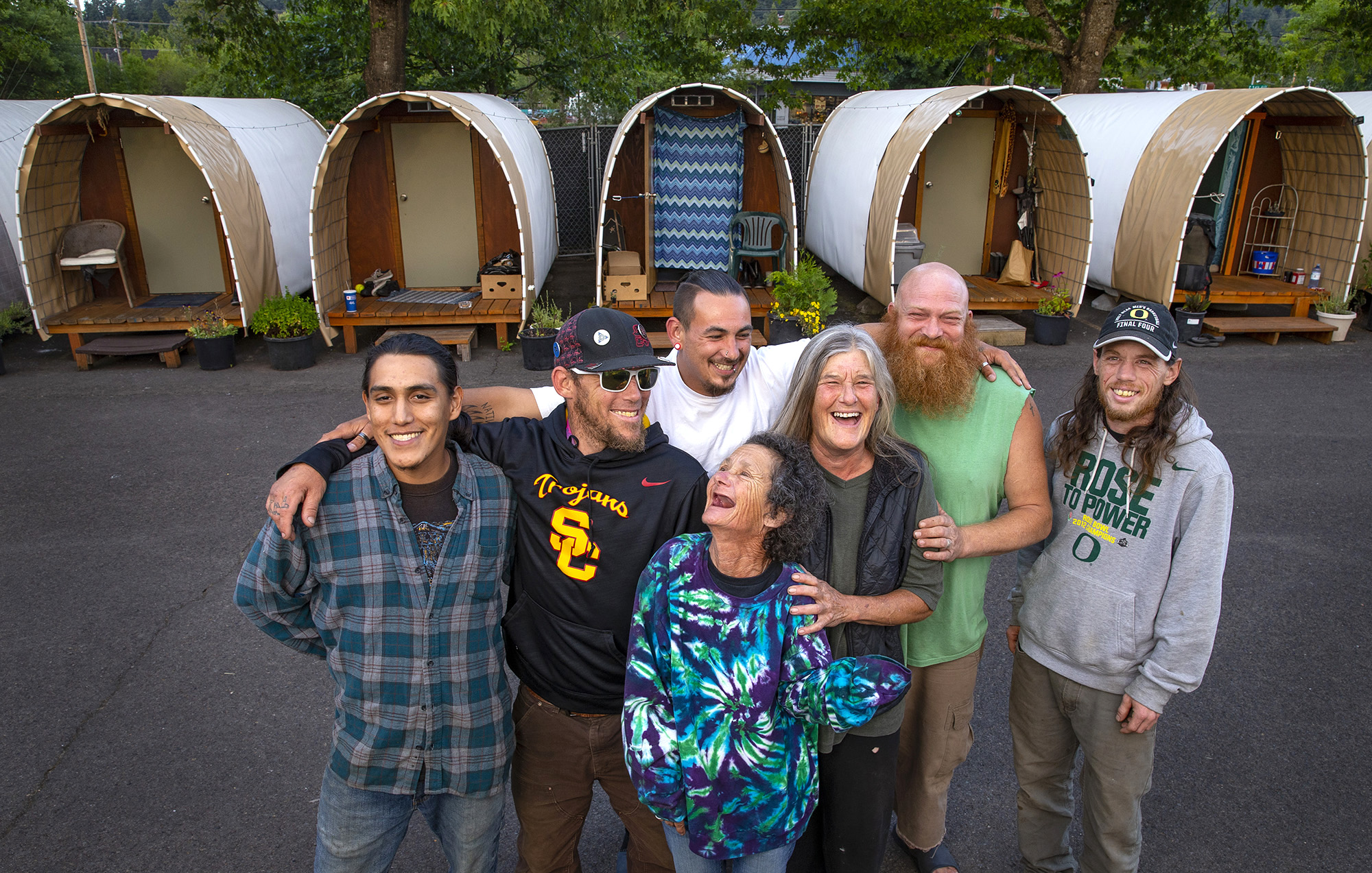
Seeking shelter
Editor’s note: On the last Wednesday of January, volunteers fanned out across Lane County in search of people experiencing homelessness. They counted 2,165 individuals. Of those, 426 were staying in emergency shelters, 106 were living in transitional housing and 1,633 adults and children were without any place to live. Of those, 841 were deemed “chronically” homeless. The total number of unhoused counted that day represented a 32% increase from the previous year.
In the last decade, community programs have been created and nonprofits have retooled their offerings to meet the challenge. As an example: of the total homeless counted, 411 people were living in "alternative shelter" programs such as Dusk to Dawn, Opportunity Village or in huts spread throughout the community that did not exist six years ago. There’s still a ways to go, as 2,070 people stayed in the Eugene Mission alone in 2018.
Much as been done, but much still remains to be overcome in helping people in the community find a safe, legal place to sleep.
In late June, I put out the word asking to meet people who were “seeking shelter” in the Eugene-Springfield area. The goal was to create a visual documentation of the issues, efforts and stories behind the headlines regarding homelessness. This photo essay is the result.
—Chris Pietsch, photography/multimedia director
Nightingale Hosted Shelters
Part of Eugene’s Rest Stop Program, Nightingale Hosted Shelters was born as a result of the 2011-2013 homeless protests by area groups such as Occupy, SLEEPS, and Whoville.
After a contentious cycle of illegal camps and evictions, Nathan Showers and Tracy Joscelyn began working with the City of Eugene to establish a legal camping site. The group struggled to find a permanent location until April 2017 when they established a camping site in a parking lot near the Good Samaritan Society Senior Living Home in south Eugene. A dozen people now call the site home — living in huts set up in two neat rows at Hilyard Street and East 34th Avenue.
The huts are like our “bedroom and the rest of the place is our house,” Showers said.
Deni Milan lived on the streets for years. “I am old enough that I just couldn’t live on the streets anymore,” the 64-year-old said during a tour of her hut at Nightingale. Since moving into her hut, Milan has been able to save enough money to buy a vehicle.
“For some of us it might take awhile to start saving money and start feeling good inside again, but this here is progress,” she said of living in the camp.
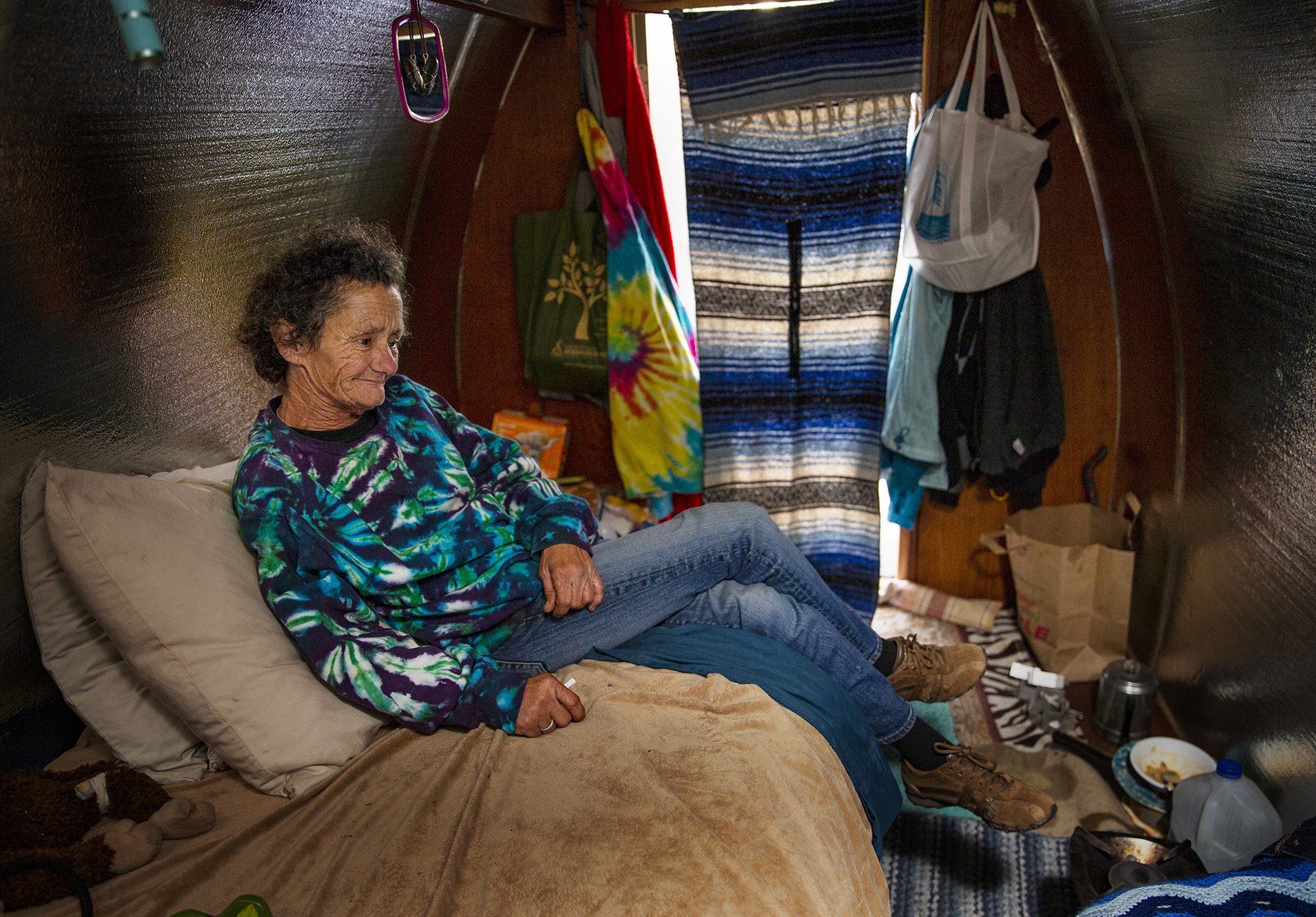
Eric Jackson
Eric Jackson and his followers have established a camp across the street from the Wayne L. Morse United States Courthouse in Eugene in protest of what he calls the “criminalization of homelessness,” after the group was evicted from a 5th Avenue site.
Jackson says he is protesting the “unconstitutionality of the process that starts the second a cop is standing over you to wake you up.”
The Civil Liberties Defense Center is representing Jackson in challenging a curfew imposed on the Wayne Morse Free Speech Plaza that led to his February arrest for criminal trespass.
His solution to homelessness? First, “Stop waking sleeping people to give them a camping ticket and give them plenty of time to pack up and move out.” Second? Create several low-barrier camping sites in the community and allow stable members of the homeless community to manage them.
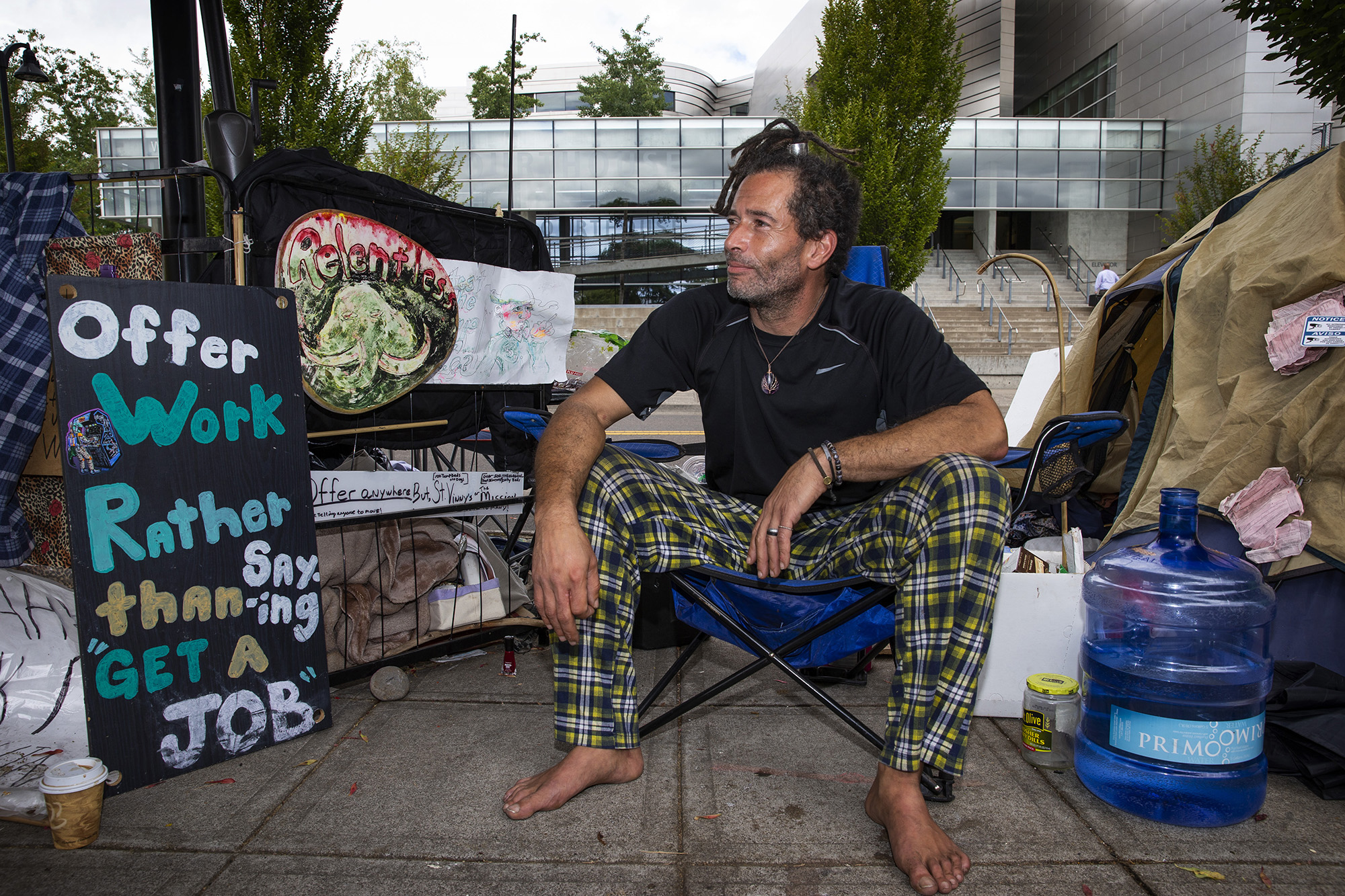
Nana and Mason
“I was the first one to hold him," Linnette Duty said of her 6-year grandson Mason Wilson. "He has been kind of mine ever since," she added.
Duty moved from Texas with her daughter and Mason two years ago and has lived at the Eugene Mission since. She is hoping to find a home through Section 8 housing, a federal rental assistance program, but the local wait list is more than a year.
In the meantime, Duty plays games with her grandson, takes him to the pool thanks to a bus pass from the Eugene Mission and is saving money to get her car repaired. "I'm on all kinds of lists (for housing). It is just a waiting game," she said.
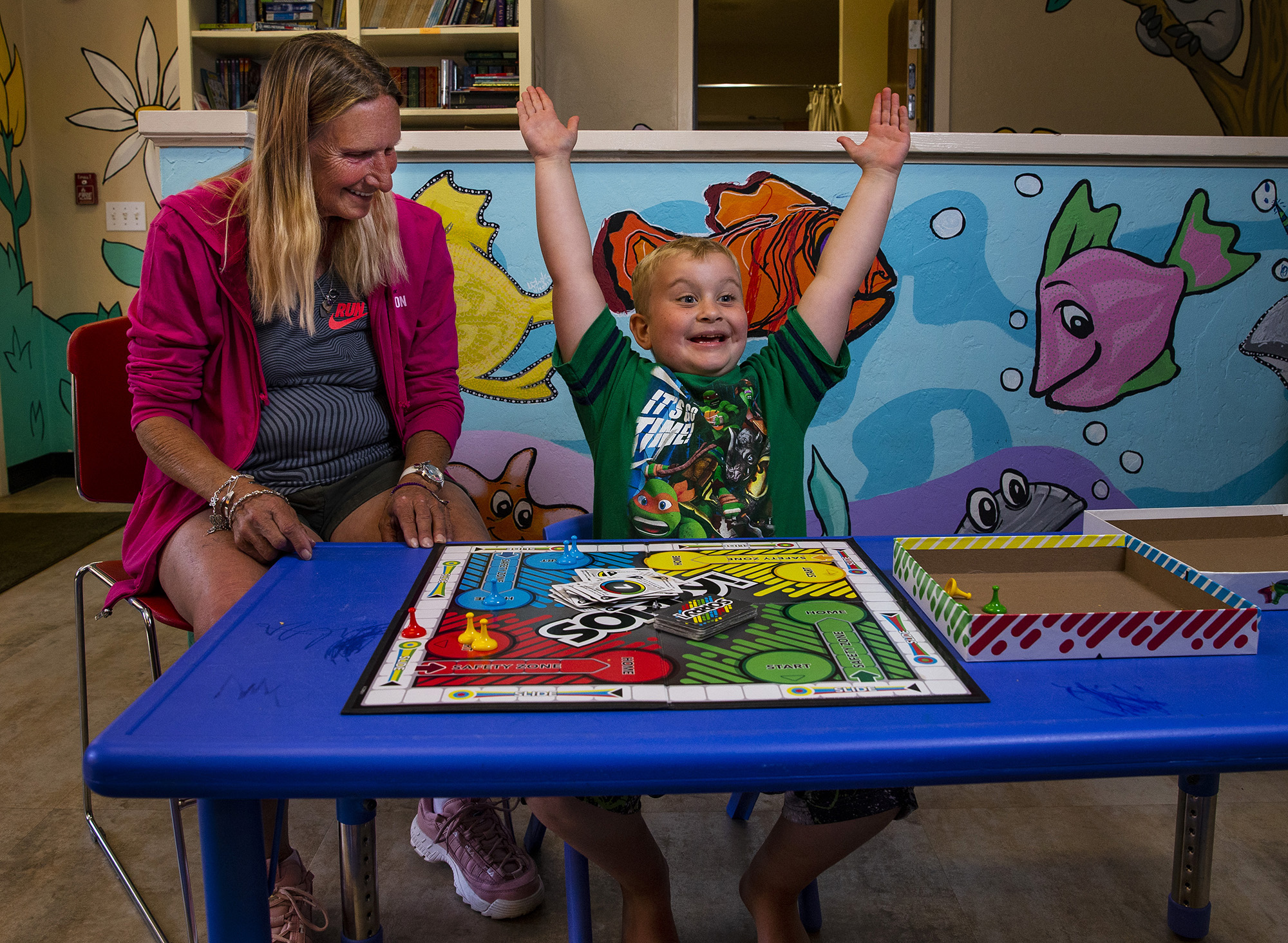
Dolores Pecot
Dolores Pecot moved to Eugene to escape domestic violence and to be close to one of her daughters. For now, she is living in the women’s dorm at the Eugene Mission. Her advice? “If you are in a domestic violence (situation), you just have to get out.”
Pecot’s hope for the future is to open a restaurant with members of her family. The menu would be inspired by the tastes of her 12 grandchildren. She already has picked out a name, “Grandma Loves,” she said, adding, “God is good and I know he is guiding my life right now.”
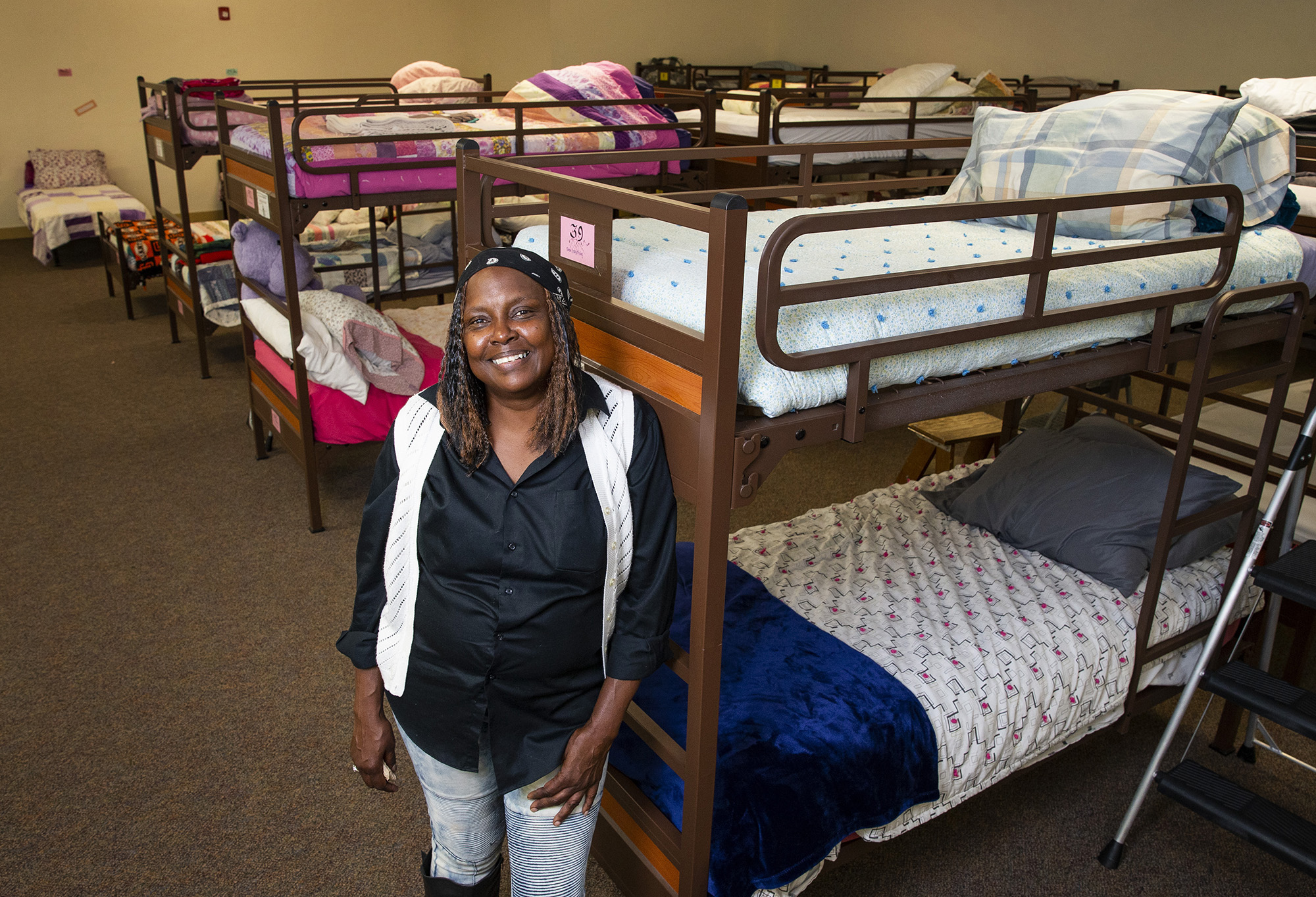
The Walkers
After losing their property manager jobs, which came with a place to live, Kathy Walker, left, and Audie Walker, with cat Krystalball, bounced around with family members before moving into an RV three years ago, next to the Eugene home owned by Kathy’s mother. The arrangement has allowed the Walkers to help their aging mother stay in her home while providing them a place to park the RV off city streets.
While Audie works as night watchman at area hotels, Kathy is working with Carry It Forward, a nonprofit that delivers donated goods directly to unhoused individuals in the area or to organizations such as the Egan Warming Center, Occupy Medical and Family First Shelter.
She also is working to get a project off the ground called Happy Camper Sanitation Crew, which seeks to provide cleanup services to campers. Kathy said she asked campers “What do you need? What can I do for you?” The overwhelming response? “We need a way to get our garbage out.” Walker estimates that she and her crew have hauled more than a ton of garbage to the dump in two pilot projects earlier this year, adding that the campers involved paid the dumping fees themselves.
For now, the Walkers are content to continue their present living arrangement, concentrate on their jobs and help keep their mother in her home.
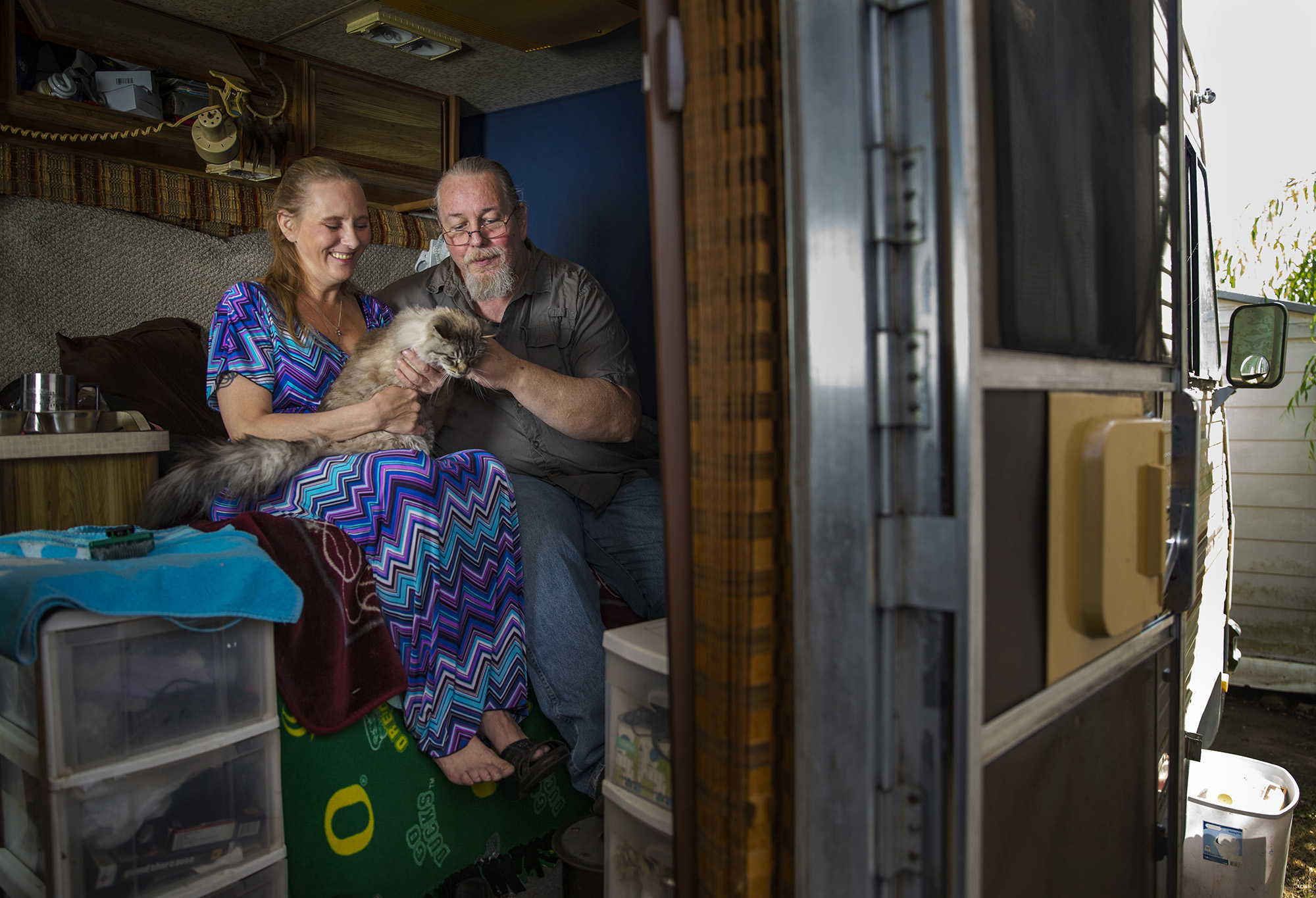
Father Rodney Retzman
For the first time in many years, Father Rodney Retzman has a place to set up his worship altar and favorite candle. For several months he has lived in a Eugene house with four other men through a housing for veterans program managed by ShelterCare. The private, nonprofit human services agency provides housing and support services for individuals and families who are homeless or on the verge of homelessness.
Retzman spent years in and out of jail and on the street. He credits Eugene police officers for helping turn his life around by suggesting social services programs to help him get clean and sober. “Having someone tell me I was worth saving really helped,” he said.
After a period at the Eugene Mission, Retzman applied for transitional housing through ShelterCare earlier this year. Now an ordained minister, he hopes to one day have his own home, but is grateful for the help he receives in the sober group home in which he now lives. “The people at ShelterCare do much more than help with housing. They help me keep my life on track. I have lived in places where I didn’t want to go home. This is a place, that yes, I want to come home,” he said.
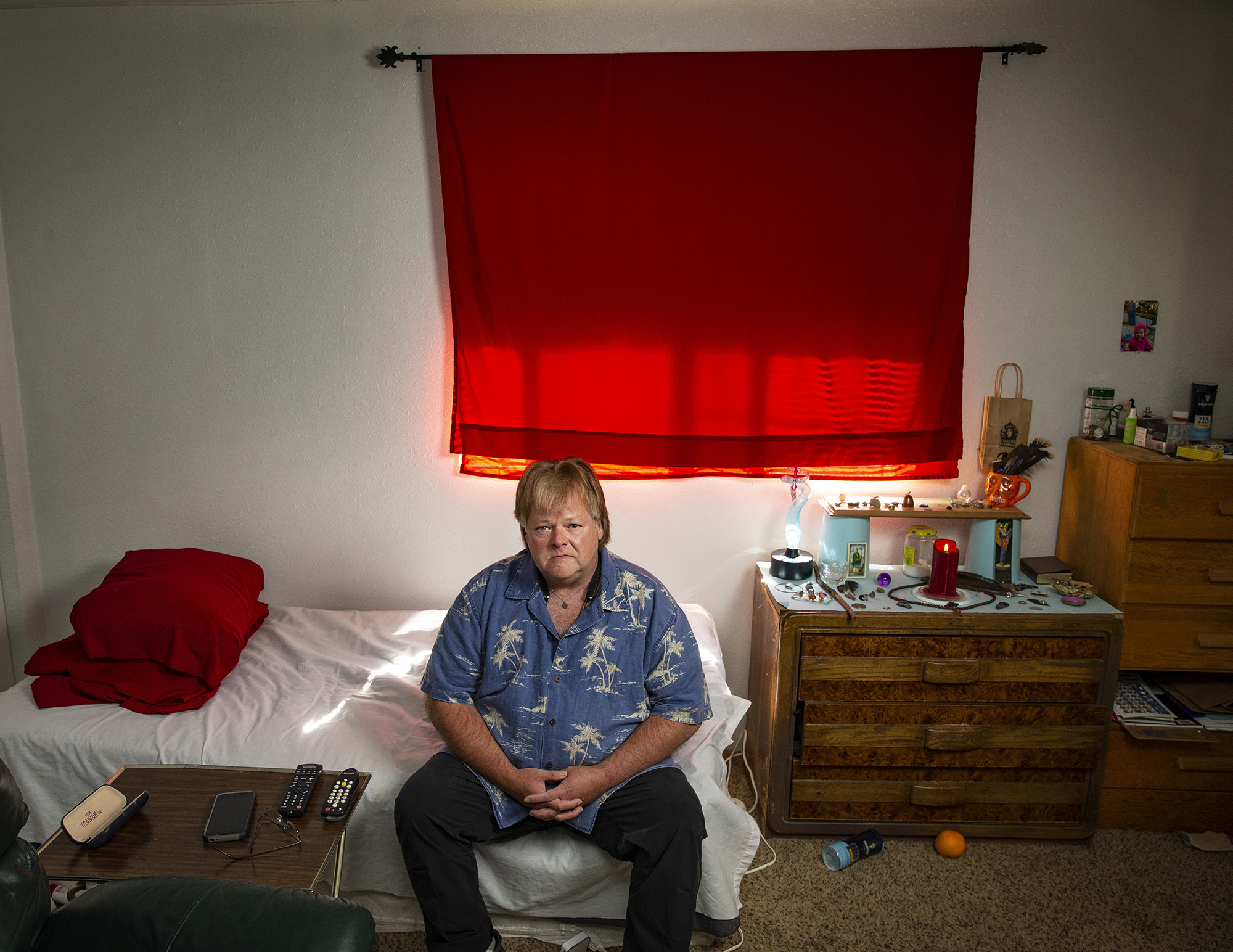
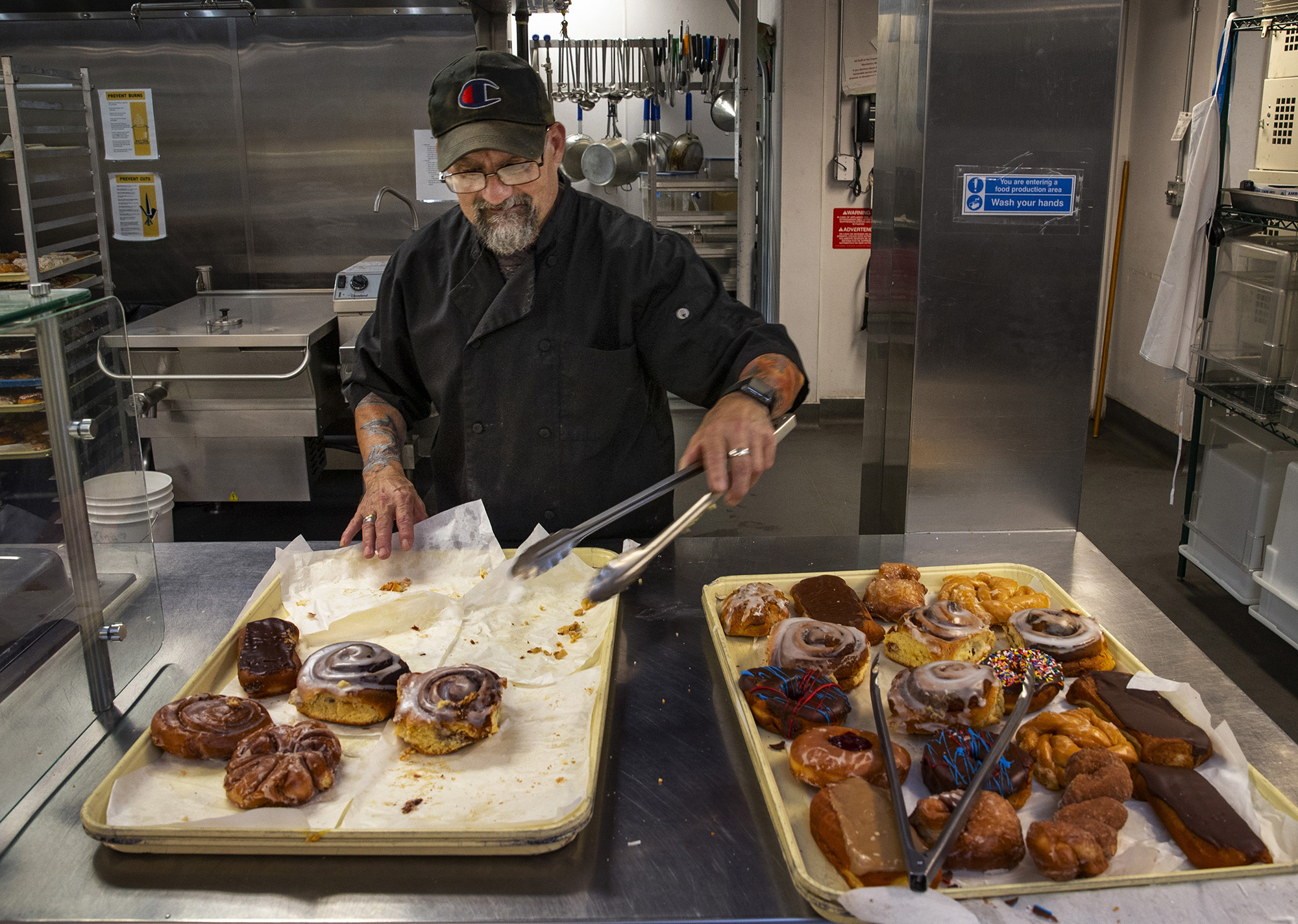
Greg Thornbury
Greg Thornbury is an Army veteran who served from 1986 to 1988. He admits that he ended up at the Eugene Mission because “my parole officer told (me) to. I had a really bad drinking problem,” he added. Resistant at first, Thornbury, enrolled in the Eugene Mission’s Life Change Program, got sober and landed a job, first as a part-time warehouse manager at the mission and more recently as a full-time cook in the mission’s kitchen.
In December, he was offered a hut in the Veterans Safe Spot camp run by Community Supported Shelters across the street from the Eugene Mission. He now serves as the event coordinator for the veteran’s camp as well.
"The Eugene Mission has been a godsend for me. I’m 21 months sober, they gave me a job, they and CSS have always had my back when I need it,” Thornbury said.
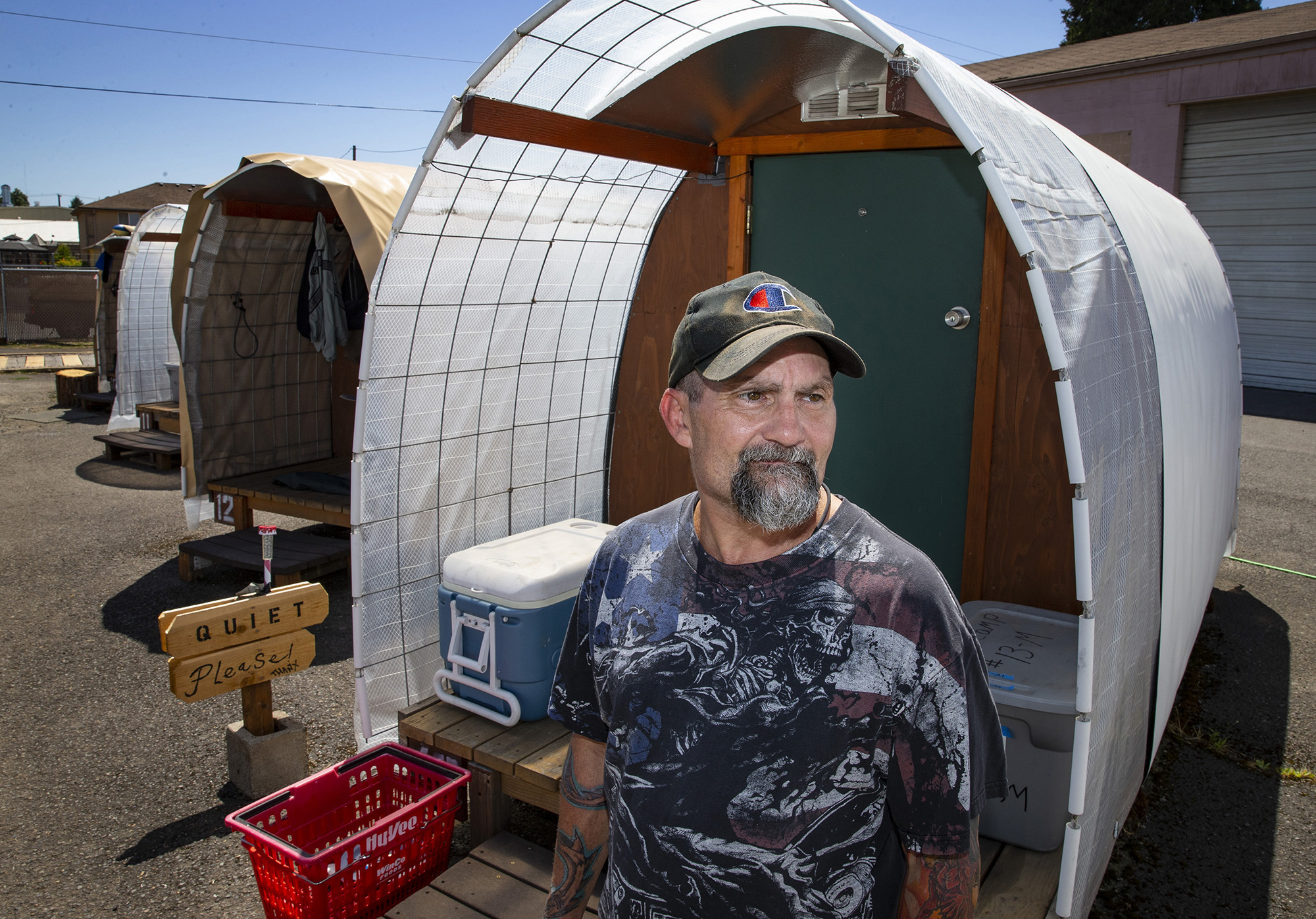
Bobbie and Dred
Bobbie Stevens has been on the move from camping spot to camping spot since moving to the area several years ago.
“We are ill and we know we need to move indoors, but finding someone who will rent to us . . . if they find out we have been homeless for over a year, they don’t want to rent to us,” said Stevens as she sorted through her belongings on a street corner in Eugene.
“If someone would let me move into their backyard, I would move off the street,” she said, adding, “I would move in a heartbeat.”
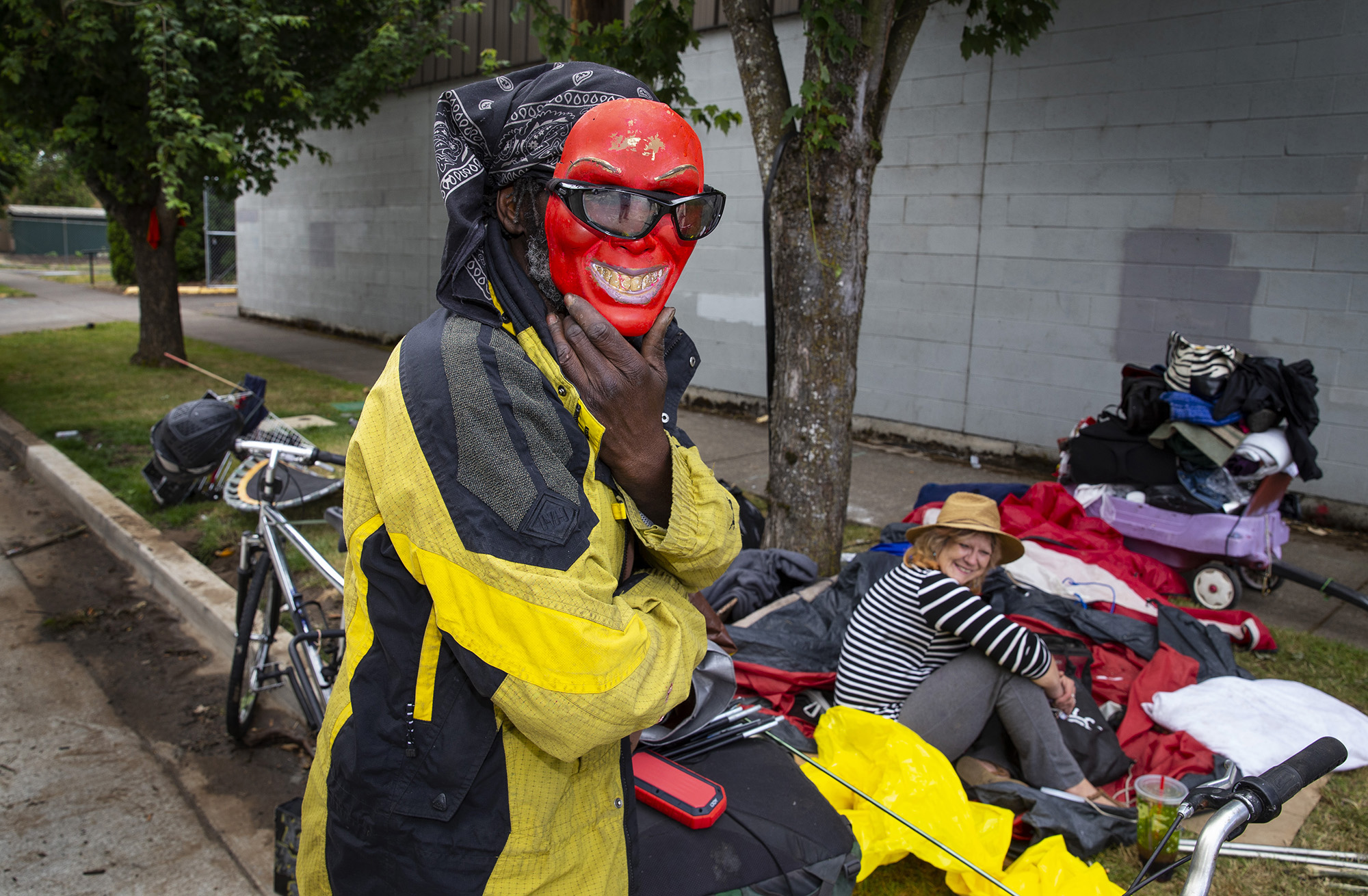
David Porter
A painter by trade, David Porter said a year ago he was living in a camper that he would park at worksites, but “the RV was towed and I couldn’t afford the impound fees." “I have been living on the streets ever since," he said.
Recently, Porter has been camping on a grass strip near Washington Jefferson Park, but a new ordinance passed by the City of Eugene allows police to evict campers from camping on planter strips in the city under threat of arrest. He has been working at clearing the area near his campsite in hopes of convincing a nearby business owner to let him continue to stay at the site.
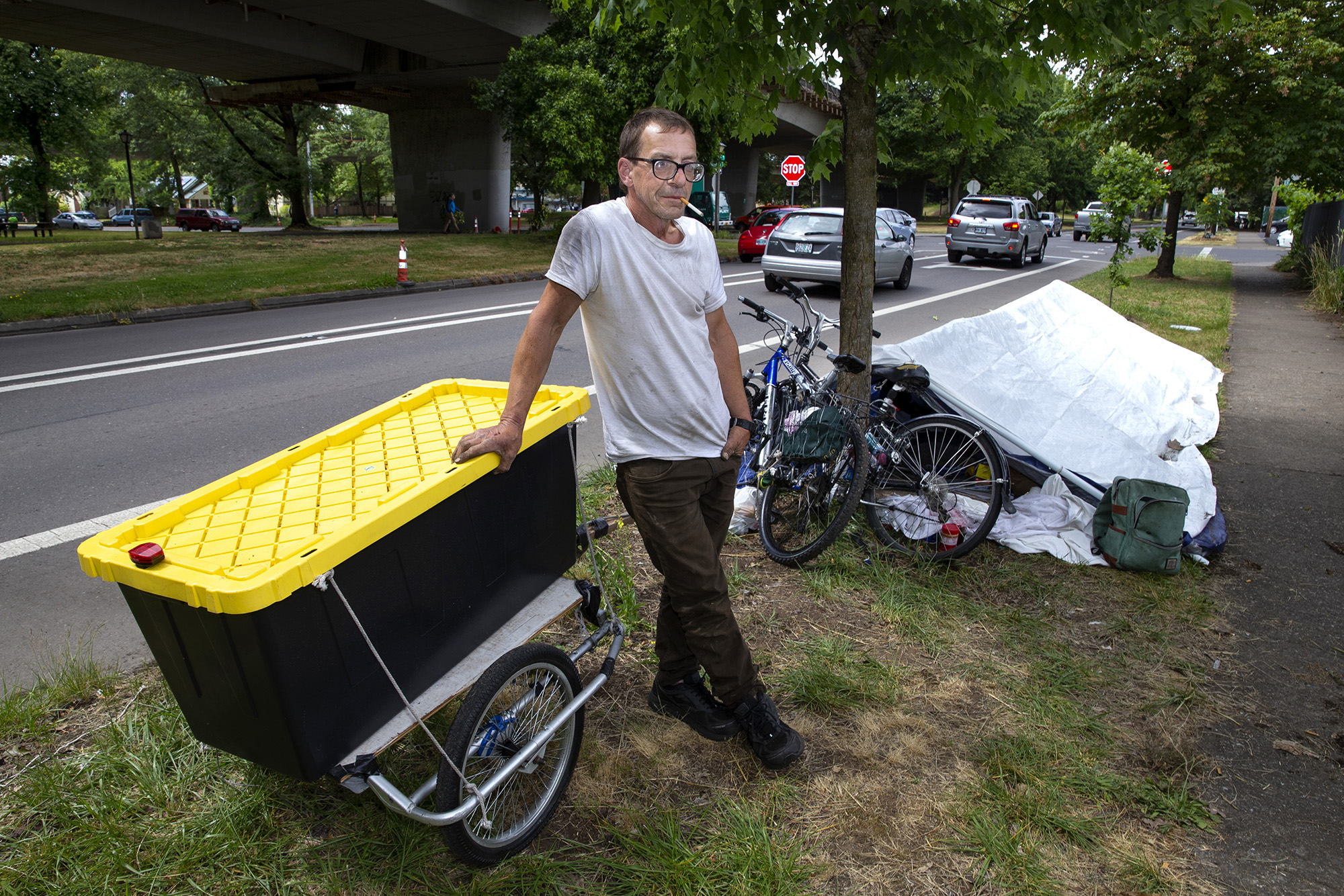
Joe Schmisek
Joe Schmisek has lived all over the U.S. during his life. He grew up in North Dakota just 60 miles from the Canadian border, but has lived in Oklahoma, Idaho and Washington, among other locations. He served in the Navy in the 1970s, went to a business school in Seattle after his discharge and attended art and computer classes during the 1990s at Lane Community College in Eugene.
Several years ago, Schmisek began helping at Eugene's Community Alliance of Lane County by creating a garden behind the Whiteaker neighborhood building. He hauled out loads of rock, amended the soil and planted dozens of flowering plants he remembers his mother growing in North Dakota or that were given to him by others, including an herb plant from the Eugene police. His volunteering to clean and pick up trash and tend to the garden has led to a verbal arrangement that allows him to live on the site.
Earlier this year, CALC gave Schmisek an award for saving its building from damage by putting out a fire set in clothing discarded on the property.
"Life has a lot to do with currents. And you want your mind focused on safe, healthy and harmless currents so your mind is in safe custody," said Schmisek during a break from his chores.
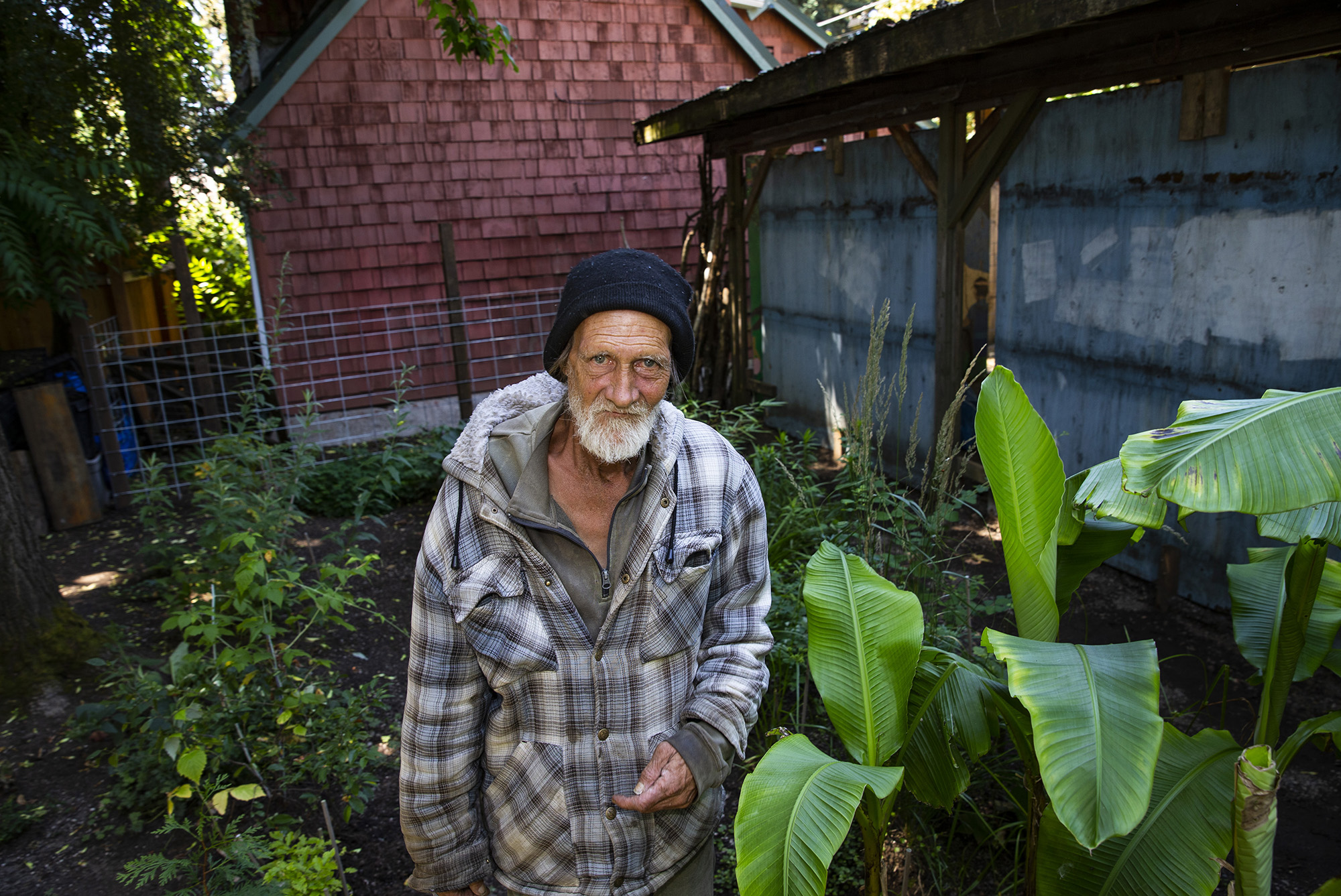
Mark Henderson
“Nobody comes in here on a winning streak,” said Mark Henderson about the journey that lead him to Eugene Mission.
“A lifetime of bad decisions got me into a situation where I was stuck,” he explained. He went through a divorce, lost his job, was drinking a lot and living on the streets of the Humboldt Bay area in northern California.
The passing of a longtime friend who “drank himself to death” while living on the streets was the catalyst that lead Henderson to choose a different course. “I was pretty close to ending up that way too,” he said.
Henderson moved to Eugene and enrolled in the Eugene Mission’s Life Change Program. “A lot of us end up where we are from running from our problems. This (program) brings up a lot of emotions and makes you look at stuff you don’t necessarily want to look at,” Henderson said.
Since arriving, he has met others who have succeeded in turning their lives around. They have provided inspiration for his own struggle. “I was at a point in my life where I wanted to confront my problems so I could live the rest of my life fruitfully,” Henderson concluded.
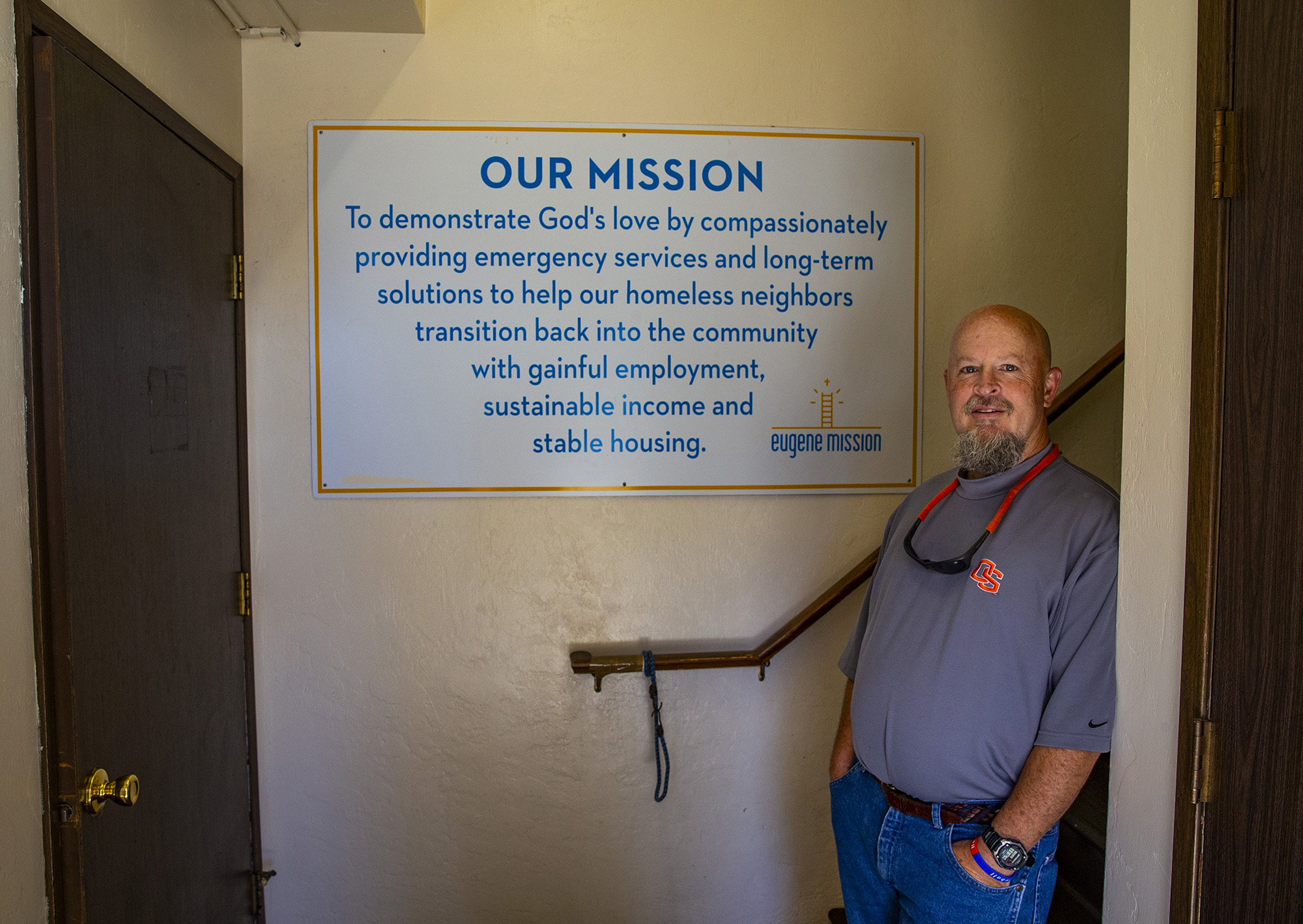
Dale Newton
Dale Newton has been staying at the low barrier Dusk to Dawn shelter off and on for years. Created four years ago, the Dusk to Dawn program provides tents with sleeping areas at night for more than 200 people, along with food and access to showers during the day at the nearby Lindholm Center.
People in the program gather at the Lindholm Center at 5 p.m., receive a meal around 6 p.m. and then make their way down the street to a group of tents off Highway 99. Once settled, they are free to come and go until 11 p.m. when the fenced area is closed for the night. A wake-up call comes at 6 a.m. and the shelter closes each morning at 8 a.m.
Newton is grateful for the free meal and a place to sleep for the night. He works part-time in landscaping, but only a few days a week for a few hours and doesn’t make enough money to afford a place of his own. Looking around the room full of people, Newton said, “This program is actually very good. It is a chance to show the community that a shelter like this can work."
Follow Chris Pietsch on Twitter @ChrisPietsch, Instagram @ChrisPietsch or email cpietsch@registerguard.com.
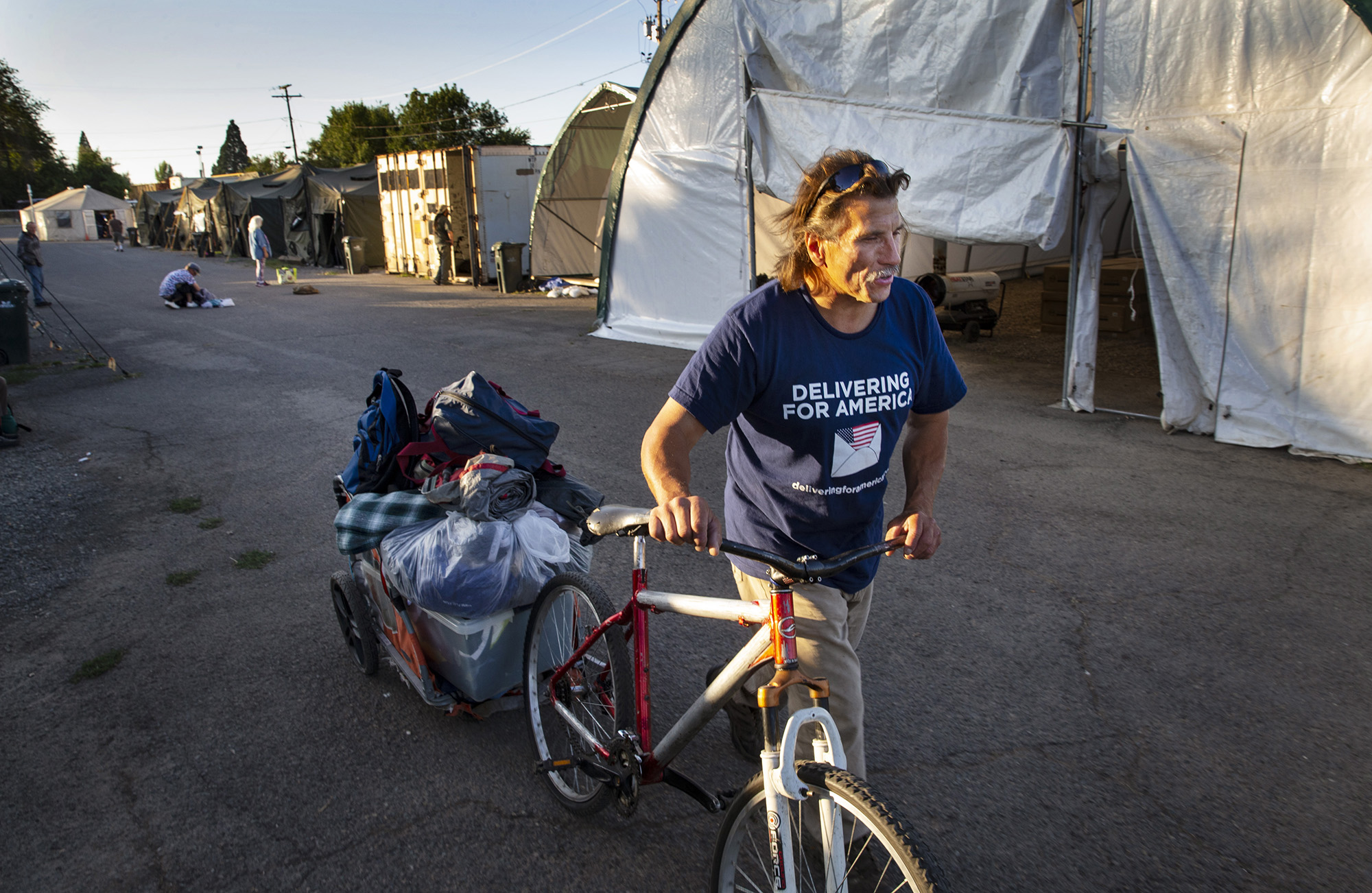
Emergency Services Provider List
Catholic Community Services: Eugene Community Service Center, 541-345-3642 and Springfield Community Service Center, 541-747-0221, www.ccslc.org
Community Sharing Program: Cottage Grove, 541-942-2176, www.communitysharing.org
Eugene Mission: 541-344-3251, www.EugeneMission.org
Looking Glass - Station #7: Serves runaway and homeless youth, 541-689-3111, www.LookingGlass.us
ShelterCare: Family Housing Program, 541-689-7156, www.ShelterCare.org
Siuslaw Outreach Services: Siuslaw Area Women's Center, 541-997-2816, www.florencesos.org
St. Vincent de Paul: Eugene Service Station, 541-461-8688; First Place Family Development Center, 541-342-7728, www.svdp.us
White Bird: Crisis Service Center, 541-687-4000, www.whitebirdclinic.org/crisis